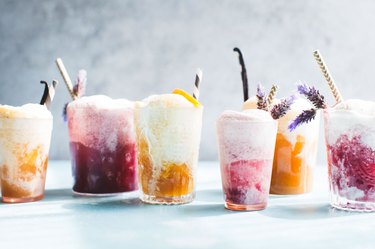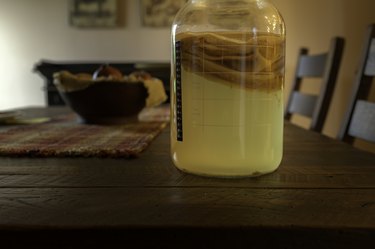
The drink of 2019 has arrived, and it's a fun spin on an old-school soda float. The kombucha float is exactly what it sounds like: bubbly, cold kombucha tea topped with ice cream, sorbet or frozen yogurt. But you may be wondering: Is this drink healthy, or just dessert in disguise?
What Is Kombucha, Anyway?
Video of the Day
At its simplest definition, kombucha is fermented tea, usually black or green.
Video of the Day
If you're not really sure what "fermented" means, let's break it down: Fermentation is the process by which bacteria, yeasts or other microorganisms break down a carbohydrate food and convert it into alcohol and carbon dioxide (read: bubbles). The process can also result in organic acids, such as acetic acid, which gives off a sour taste, according to the Journal of Food Science. In kombucha's case, the carbohydrate is sugar, which is paired with a culture of yeast and bacteria. The result is a lightly fizzy, slightly alcoholic, sweet-and-sour spin on tea.
While you can buy all different types of kombucha in the grocery or health food store, many people choose to take on the challenge themselves and make it at home. The easiest way is to purchase a SCOBY, or symbiotic culture of bacteria and yeast. The SCOBY is not pretty to look at, but it's the secret ingredient that transforms sugar and tea into kombucha.
OK, So Is It Good for Me?
Fermented foods and their benefits have been studied for years. Cheese, wine, beer, sauerkraut, kimchi and pickles are all examples of fermented foods that you might eat regularly. An August 2012 study in the journal Recent Patents on Food, Nutrition, and Agriculture indicates that fermented foods and beverages comprise up to 40 percent of people's diets in some areas of the world.
Kombucha advocates claim the drink can help manage and even prevent serious health conditions, from high blood pressure to cancer. But there isn't enough human research on kombucha to definitively link it to any such major health perks.
According to the Mayo Clinic, though, there is some evidence that the tea's bacterial properties may offer benefits similar to probiotic supplements, such as supporting a healthy immune system and preventing constipation. And it may have the power to boost your mood, too: A February 2017 review of 10 studies, published in the Annals of General Psychiatry, found that probiotics may be useful in alleviating symptoms of depression.
Many of kombucha's potential benefits come from the tea it's made from. According to Harvard Health Publishing, both green and black tea seem to reduce inflammation in the body, and regular drinkers may be less likely to have heart attacks and strokes.

Nutrition Facts on Kombucha Floats
The nutrition profile of kombucha will vary based on how it's made (type of tea and SCOBY used, amount of sugar added, fermentation time, etc). The Journal of Food Science indicates that after 15 days of fermentation, kombucha generally contains a host of organic acids, B vitamins, vitamin C and tea polyphenols. It will also include a trace amount of minerals, such as copper, iron and zinc, but not enough to make a difference in your diet.
Calorie content varies, but kombucha generally comes in much lower than your typical soft drink. Eight ounces of GT's Original Enlightened Kombucha, for example, has 25 calories and 6 grams of sugar. Compare that with 7.5 ounces of regular Coke, which clocks in at 90 calories and 25 grams of sugar, and kombucha looks like the healthier alternative. Add a half cup of your favorite frozen dairy or non-dairy dessert, though, and you may be adding up to 200 calories and 21 grams of sugar.
In total, a kombucha float with 16 ounces of kombucha and a half cup of vanilla ice cream will give you energy in the form of roughly 200 to 250 calories and 20 to 30 grams of sugar, most of which is added sugar.
If you're ready to give kombucha floats a try, but you also want to punch up the health factor a little, there are a few substitutions you can make. Choose a kombucha with as little sugar as possible. (Keep in mind that some kombucha brands are flavored with juice, which can add extra sugar.) Also, opting to make your own sorbet from fruit is a lower-calorie, reduced-sugar alternative to ice cream.
Tip
For a healthier spin, opt to top your kombucha with sorbet made from fresh fruit rather than ice cream.
What to Know Before You Indulge
For most adults, kombucha floats are harmless, especially if the kombucha is purchased from a reputable food company. When kombucha is first produced, there may be a trace of alcohol present, but according to experts at Colorado State University, these levels can grow after bottling and may be up to 0.5 percent. Any higher than this, and the drink must be labeled as an alcoholic beverage. So, people who are pregnant, on certain medications or are otherwise avoiding alcohol for health reasons should use caution when consuming kombucha.
But other health concerns arise when it comes to drinks made with home-brewed kombucha. If the container or equipment you use isn't sanitized, or the temperature isn't quite right during fermentation, the SCOBY could become contaminated. For this reason, everyone should be careful when drinking homemade kombucha, and especially children, the elderly and those with compromised immune systems.
Read more: 15 Cold Summer Treats Under 200 Calories
The Bottom Line
If you're looking for a dessert that's refreshing and different, the kombucha float is a nice twist on the old classic. It's not exactly a health food, but you do get slightly less added sugar by using kombucha over a regular soft drink. There's nothing wrong with having a kombucha float every now and then, but as with any sweet treat, it shouldn't be a daily indulgence.
- American Homebrewers Association: How to Make Kombucha
- Journal of Food Science: "Understanding Kombucha Tea Fermentation: A Review"
- Recent Patents on Food, Nutrition, and Agriculture: "Fermented Foods: Patented Approaches and Formulations for Nutritional Supplementation and Health Promotion"
- GT's Living Foods: "Original Enlightened Kombucha"
- Food Source Information: Colorado Integrated Food Safety Center of Excellence: "Kombucha"
- Mayo Clinic: "What is kombucha tea? Does it have any health benefits?"
- Annals of General Psychiatry: "https://www.ncbi.nlm.nih.gov/pmc/articles/PMC5319175/"
- Harvard Health Publishing: "Flavonoids: The secret to health benefits of drinking black and green tea?"